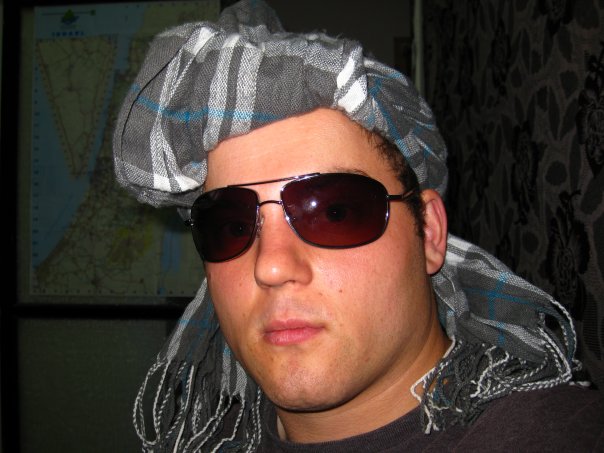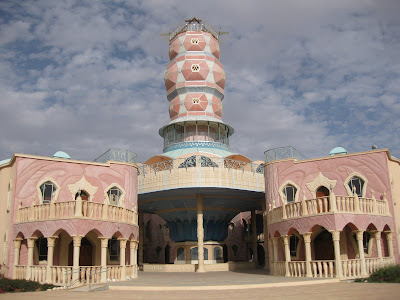
A few days ago, the group went to an exciting soccer game between two teams with bitter rivalries: Jerusalem Betar vs Tel Aviv Hapoal. (Note: That teams in Israel have traditionally been separated by political affiliations; Betar representing the far-Right with chants like "Kill the Arabs" and Hapoal (meaning Workers), a quasi-communist team with ironically, Che Guevara as their hero. Naturally, both teams have an incredible amount of animosity toward each other, with fights occurring frequently between fans. Upon reaching the Hapoal gate (separate entrances for fans of each side), we placed our bags in metal detectors (the ones found in airports) and proceeded to show our ticket to the attendant where we then were frisked for guns, metal objects, knives etc. The frisk was thorough and done by army guards. Before the game started the atmosphere was intense. People on both sides were chanting loudly. Most of which I could not understand, but later found out that chants went as follows: "Jerusalem sits on their own penis", as well as Hapoal fans calling of their former players a neo Nazi for joining Betar. The game was full of excitement, like nothing I had ever seen before—it was a true European feeling of crazy fans. The game was pretty evenly played, until about a quarter through it when Hapoal scored two goals in a few minutes. Tel Aviv went crazy for their team. By the end of the game, we won 4-0 and the Betar fans had lit their seats on fire!
On Tuesday, it was election day in this country. We all took the day off from Ulpan because everything was closed. It's been very interesting to see what the issues are on the ground. There seems to be very little distinction between left and right in this country; rather, because security takes precedence, all popular parties have very similar policies toward security and even the status of the Palestinians. It is also true that historically, right wing governments have been the only coalition governments able to successfully negotiate land for peace deal (Manechem Began gave Sinai for Egypt's recognition of Israel--but its also necessary to know that the Sinai isn't considered to be historically part of Judea-Samaria and therefore was much easier to give away politically).
The issue this election, like all others, is security but what is sad is that underneath the conflict, there are some very serious issues that are rarely addressed and never spoken about outside of Israel. For instance, in regards to education, less than 50 percent of Israelis graduate high school and of those who do, only 15 percent go on to university. I bet you didn't know that. If the right wing manage to form a coalition under BB Netenyahu (Likud), they will inevitably continue the dangerous path of neo-liberal economics in very shaky economic times furthering the rate of inequality between rich and poor (Israel has one of the highest rates of inequality in the world--talk about going back on Jewish values). The results this time around were not very surprising; however, much more disconcerting was the popularity of Israel Beitenu. For those of you who do not know, the party is headed by Avigidor Lieberman, a man known for his nearly fascist rhetoric on the status of Palestinians and Israeli Arabs. His party's slogan is "Without Loyalty, there is no citizenship". This time around, they received more popular support than Avodah (Labour) and seem to hold the balance of power. Tzippy Livni (Kadima) has been given 100 days to form a coalition, but whatever she does, she will most likely have to include Israel Beiteinu in the coalition. Many Israelis see his popularity as purely a reaction to the Gaza conflict. How is this different than the popularity of Hamas? Are all people who voted for Israel Beiteinu fascists xenophobes? I do not think so. But neither are those who support Hamas. The situation is always much more complex than it seems to be on the surface.
On a separate note, yesterday was volunteer selection day:
1) College For All.
As I said earlier:
"College for all works in Jaffa with young, enthusiastic, bright students (Arab Muslim and Arab Christian). The aim of the programme is to increase the number of Arab students who reach the level of post-secondary education (whether it be college or university). Levels of poverty in Jaffa are extremely high, with nearly 50 percent of all residents living in abject poverty. College for all is designed as an after-school programme which buses in students from all 3 local schools in the Jaffa area. The students learn Math, Hebrew, English, Chemistry and Physics. The aim of the programme is to have fun with students (who wants to sit in yet another class from 4-8pm?). They come 2 times a week, play games and are fed meals. The programme begins in Grade 3 and runs all the way to Grade 12. The idea is to show these kids that school is important and when they put their minds to it, anything is possible. The programme in only 5 years old, but so far they have seen remarkable success rates and hope to expand in the next few years.
This idea isn't new; it has been in existence for Jews in Israel for many years and showed great success rates. I would be working with the teachers with English and basic math. Although I have very little teaching experience, having a mentor who speaks English fluently will surely be an asset to the programme."
I am really interested in coexistence work between Arabs and Jews. This programme sounds very well tailored to better understanding the needs of this community. Until last year, there were no Jews working at the centre. Tikkun Olam is the first. This year the program expanded to include Soldiers, but because of the war, there were issues with them coming back.
I'll be doing College For All, Tuesday and Wednesday afternoons.
2) Beth Hatefutsoth (Diaspora Museum)
I'm working with a woman from Argentina who needs help collected genealogy projects from all over the world. She reads the submission and assesses it based on certain criteria. I'll be using my Spanish abilities to communicate to her (she only speaks Hebrew and Spanish!) and to read the submissions. Also part of the time will be spent learning about the museum itself, and hopefully tracking down my own family history. It's a change of pace from the other volunteer places, and it gives me a chance to use Spanish. I'm excited to find out the specifics.
3) Nofim or African Refugee Development Center (ARDC)
Nofim- An elementary school for south Tel Aviv children who come from underprivileged backgrounds. Roles would include teaching English to ESL students, but more than anything they are looking for positive role models who come on a consistent basis. Nofim also exists as a refugee centre for Darfurian's. The option also exists to work with this community, which I would love to experience.
ARDC was founded in 2004 as an Israeli non-governmental organization. It was created to assist, support and empower the African refugees and asylum seekers in Israel and to promote a humane and fair Israeli asylum policy. Based on the principle of mutual aid and empowerment (“refugees helping refugees"). The ARDC has been accommodating over 2,300 asylum seekers from Eritrea, Sudan, Ivory Coast, Somalia, Chad and other countries.
Again, the opportunity sounds unique and interesting. I need to check out the centre first before I decide between this and Nofim.
Finally, after a full month at the hostel, we have moved to our homes in Kiryat Shalom. My apartment is dirty and small, but these are small problems that I'll get over and shouldn't be a reason for not enjoying my time here. The work I'll be doing is truly needed and I think I will have an enlightening experience. I hope you can join me (at least in this blog) on the journey.
Wishing you well,
Sam
 Last weekend, we landed in the Negev Desert. The Negev is a beautiful place of extremes--hot and dry in the day and cold and windy at night. We get to our starting point and begin the hike. A few hours later, we arrive at our camping site where we need to pitch tents before darkness arrives. After pitching the tent, Susy (one of the participants, begins preparations for the meal: Homemade Pizza and Chinese Stir Fry (vegetarian and Chicken options). Many hours later and with full, satisfied bellies we all try to fall asleep in the crapped quarters of the tent. My tent slept the boys, 4 of us, in a 3 person tent. Uncomfortable, Iftach (our guide), decides to sleep outside which gives all of us more room. In the middle between sleep and being lucid, we begin to hear rain drops. Not hard rain, but soft rain. Meanwhile, all of us left our stuff outside to give more room in the tents for our bodies. We were all told that the place was secure, and robbery was the last thing on our minds. Because I didn't want to get my camera, cell phone and clothes wet, I took everything inside. So did most of my tent-mates. At about 3:30 in the morning, we are awakened by Israelis who had been sleeping about 1 km from our tents. They tell us that they had been robbed by Bedouins and the we needed to check for our stuff. 3 or 4 of my group members had all their cash and valuables taken and found their bags a few feet from our tents. We were all in shock, and I was thankful to God or whatever power that be, that rain (in the desert of all places) got me to take my things into my tent; otherwise, I'd be writing this without my Canon camera or iPod!
Last weekend, we landed in the Negev Desert. The Negev is a beautiful place of extremes--hot and dry in the day and cold and windy at night. We get to our starting point and begin the hike. A few hours later, we arrive at our camping site where we need to pitch tents before darkness arrives. After pitching the tent, Susy (one of the participants, begins preparations for the meal: Homemade Pizza and Chinese Stir Fry (vegetarian and Chicken options). Many hours later and with full, satisfied bellies we all try to fall asleep in the crapped quarters of the tent. My tent slept the boys, 4 of us, in a 3 person tent. Uncomfortable, Iftach (our guide), decides to sleep outside which gives all of us more room. In the middle between sleep and being lucid, we begin to hear rain drops. Not hard rain, but soft rain. Meanwhile, all of us left our stuff outside to give more room in the tents for our bodies. We were all told that the place was secure, and robbery was the last thing on our minds. Because I didn't want to get my camera, cell phone and clothes wet, I took everything inside. So did most of my tent-mates. At about 3:30 in the morning, we are awakened by Israelis who had been sleeping about 1 km from our tents. They tell us that they had been robbed by Bedouins and the we needed to check for our stuff. 3 or 4 of my group members had all their cash and valuables taken and found their bags a few feet from our tents. We were all in shock, and I was thankful to God or whatever power that be, that rain (in the desert of all places) got me to take my things into my tent; otherwise, I'd be writing this without my Canon camera or iPod!








